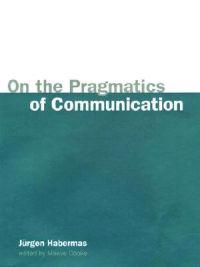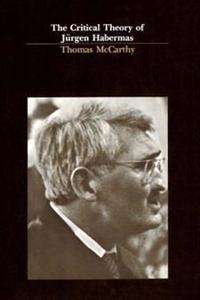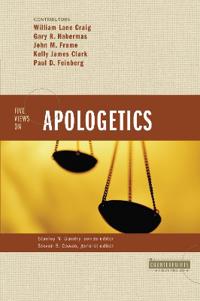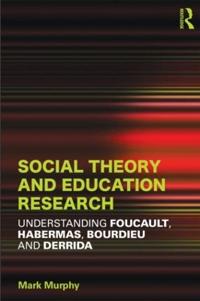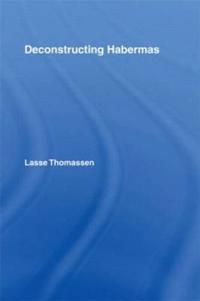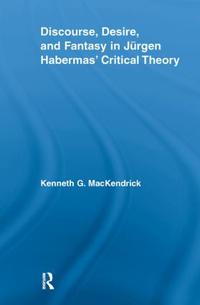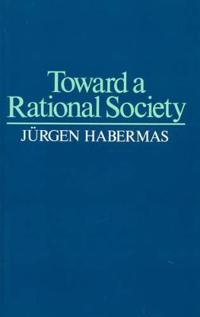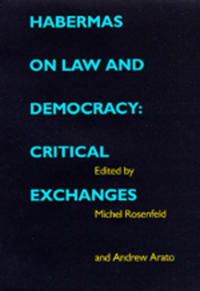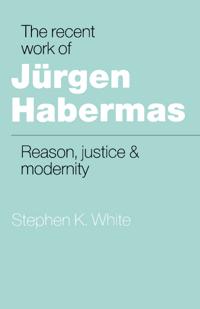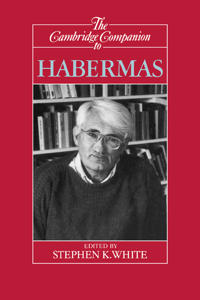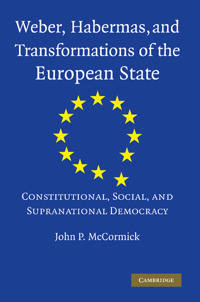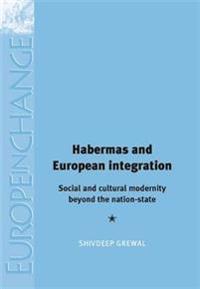On the Pragmatics of Communication (Häftad)
avJurgen Habermas, Maeve Cooke
ISBN: 9780262581875 - UTGIVEN: 2000-01J?rgen Habermas's program in formal pragmatics fulfills two main functions. First, it serves as the theoretical underpinning for his theory of communicative action, a crucial element in his theory of society. Second, it contributes to ongoing philosophical discussion of problems concerning meaning, [...]
Critique and Power (Pocket)
avMichael (EDT) Kelly, Michel (EDT) Foucault, Jurgen (EDT) Habermas
ISBN: 9780262610933 - UTGIVEN: 1994-06Which paradigm of critique -- Foucault's or Habermas's -- is philosophically and practically superior, especially with regard to the nature and role of power in contemporary society? In shaping this collection, Michael Kelly has sought to address this question in relation to the ethical, political, [...]
The Critical Theory of Jurgen Habermas (Paper) (Häftad)
avT. McCarthy
ISBN: 9780262630733 - UTGIVEN: 197801Five Views on Apologetics (Häftad)
avWilliam Lane Craig, Gary R. Habermas, Paul D. Feinberg
ISBN: 9780310224761 - UTGIVEN: 200001The goal of apologetics is to persuasively answer honest objections that keep people from faith in Jesus Christ. But of several apologetic approaches, which is most effective?Five Views on Apologetics examines the 'how-to' of apologetics, putting five prominent views under the microscope: Classical,[...]
Habermas: The Key Concepts (Övrig)
avAndrew Edgar
ISBN: 9780415303798 - UTGIVEN: 2006-02-23An independently minded champion of 'the project of modernity' in a supposedly post-modern age, Jurgen Habermas (1929- ) is one of the most widely influential thinkers of our times. An easy-to-use A-Z guide to a body of work that spans philosophy, sociology, politics, law and cultural theory, Haberm[...]
Social Theory and Education Research: Understanding Foucault, Habermas Bourdieu and Derrida (Häftad)
ISBN: 9780415530149 - UTGIVEN: 201303Although education researchers have drawn on the work of a wide diversity of theorists, a number of these have been of particular significance to education. While the likes of Karl Marx, Antonio Gramsci, John Dewey and Paulo Freire influenced previous generations of educational theorists, much of th[...]
Habermas, Critical Theory and Education (Häftad)
ISBN: 9780415536592 - UTGIVEN: 201202The sociologist and philosopher Jurgen Habermas has had a wide-ranging and significant impact on understandings of social change and social conflict. However, there has been no concerted and focused attempt to introduce his ideas to the field of education broadly. This book rectifies this omission a[...]
Deconstructing Habermas (Pocket)
avLasse Thomassen
ISBN: 9780415541169 - UTGIVEN: 2013-03This book is the first book-length deconstructive study of the political philosophy of Jurgen Habermas. Inspired by the work of Jacques Derrida, the book applies deconstruction to key issues in Habermas's work: rational discourse and rational consensus, constitutional democracy, tolerance and civil [...]
Discourse, Desire, and Fantasy in Jurgen Habermas' Critical Theory (häftad)
ISBN: 9780415541190 - UTGIVEN: 2012-03This book argues that Jurgen Habermas' critical theory can be productively developed by incorporating a wider understanding of fantasy and imagination as part of its conception of communicative rationality and communicative pathologies. Given that meaning is generated both linguistically and perform[...]
Adorno, Habermas and the Search for a Rational Society (Häftad)
avDeborah Cook
ISBN: 9780415619226 - UTGIVEN: 201010Habermas (häftad)
ISBN: 9780415773256 - UTGIVEN: 2015-08Jurgen Habermas is one of the most important German philosophers and social theorists of the late twentieth and early twenty-first century. His work has been compared in scope with Max Weber's, and in philosophical breadth to that of Kant and Hegel. In this much-needed introduction Kenneth Baynes en[...]
Habermas, Critical Theory and Education
ISBN: 9780415806176 - UTGIVEN: 2009-10The sociologist and philosopher Jurgen Habermas has had a wide-ranging and significant impact on understandings of social change and social conflict. However, there has been no concerted and focused attempt to introduce his ideas to the field of education broadly. This book rectifies this omission a[...]
Habermas and Rawls (Häftad)
avAlex MacLean
ISBN: 9780415836555 - UTGIVEN: 201302Habermas and Rawls are two heavyweights of social and political philosophy, and they are undoubtedly the two most written about (and widely read) authors in this field. However, there has not been much informed and interesting work on the points of intersection between their projects, partly because[...]
Introduction to Critical Theory: Horkheimer to Habermas (Övrig)
avDavid Held
ISBN: 9780520041752 - UTGIVEN: 1980-10-13The writings of the critical theorists caught the imagination of students and intellectuals in the 1960s and 1970s. They became a key element in the formation and self-understanding of the New Left, and have been the subject of continuing controversy. Partly because of their rise to prominence durin[...]
Habermas on Law and Democracy (Inbunden)
ISBN: 9780520204669 - UTGIVEN: 1998-09Drawing upon his discourse theory, Jurgen Habermas has elaborated an account of law that purports to bridge the gap between democracy and rights, by conceiving law to be at once self-imposed and binding. His proceduralist paradigm of law and further explorations by others are included.[...]
Insight and Solidarity: The Discourse Ethics of Jurgen Habermas (Övrig)
avWilliam Rehg (S. J.)
ISBN: 9780520208971 - UTGIVEN: 1997-04-17Discourse ethics represents an exciting new development in neo-Kantian moral theory. William Rehg offers an insightful introduction to its complex theorization by its major proponent, Jurgen Habermas, and demonstrates how discourse ethics allows one to overcome the principal criticisms that have bee[...]
The Recent Work of Jurgen Habermas (Pocket)
avStephen K. White
ISBN: 9780521389594 - UTGIVEN: 1989-10Jürgen Habermas is one of the foremost philosophers and social theorists in the world today. But the complexity and breadth of his thought make him often difficult to understand. In this book, Stephen White offers a clear, accessible, and reliable introduction to Habermas?s work, particularly that [...]
The Cambridge Companion to Habermas (Häftad)
ISBN: 9780521446662 - UTGIVEN: 199504Jurgen Habermas is unquestionably one of the foremost philosophers writing today. His notions of communicative action and rationality have exerted a profound influence within philosophy and the social sciences. This volume examines the historical and intellectual contexts out of which Habermasâ[...]
Habermas (Pocket)
avMatthew G. Specter
ISBN: 9780521738316 - UTGIVEN: 201009This book follows postwar Germany's leading philosopher and social thinker, Jurgen Habermas, through four decades of political and constitutional struggle over the shape of liberal democracy in Germany. Habermas's most influential theories - of the public sphere, communicative action, and modernity [...]
Weber, Habermas and Transformations of the European State (häftad)
ISBN: 9780521743631 - UTGIVEN: 2009-01This book critically engages Jurgen Habermas's comprehensive vision of constitutional democracy in the European Union. John P. McCormick draws on the writings of Max Weber (and Habermas's own critique of them) to confront the difficulty of theorizing progressive politics during moments of radical st[...]
Habermas and Theology
ISBN: 9780567491831 - UTGIVEN: 2015-06An exploration of the theological reception and critique of Habermas' philosophy in the different phases of its engagement with religion.[...]
Habermas and European Integration
ISBN: 9780719096624 - UTGIVEN: 2015-02From its conception to the referenda of 2005 where it met its end, German philosopher Jurgen Habermas wrote in support of the European Constitution. This is the first in-depth account of his project. Emphasis is placed on the conception of the European Union that informed his political prescriptions[...]

